Snow in Vancouver .. as 265 Ottawa MPs drink Québécois nation Kool-Aid
Nov 27th, 2006 | By Counterweights Editors | Category: Canadian Provinces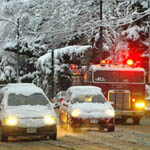 OTTAWA. MONDAY, NOVEMBER 27, 2006. 10:30 PM ET. Earlier this evening the Canadian House of Commons voted 265-16 in favour of the resolution “That this House recognizes that the Québécois are a nation within a united Canada.”
OTTAWA. MONDAY, NOVEMBER 27, 2006. 10:30 PM ET. Earlier this evening the Canadian House of Commons voted 265-16 in favour of the resolution “That this House recognizes that the Québécois are a nation within a united Canada.”
At about the same time old federal Liberal policy guru and Pierre Trudeau admirer Tom Axworthy was on TV, explaining that the 265 MPs voting Yes were “just all drinking the same Kool-Aid … The Canadian political class is turning itself into a pretzel to appease the nationalist vote in Quebec.” More than a few Canadians outside Quebec share Mr. Axworthy’s feelings. And Conservative intergovernmental affairs minister Michael Chong has resigned from the cabinet. But Canadian institutions and the Canadian people now have some time to try the Québécois nation notion on for size. It may work out. Or it may not. And Canada will carry on in any case. Nothing about this place has ever been written in stone.
A few details on today’s debate in Parliament …
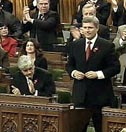 Here are a few random notes from various hands, wandering in and out of the parliamentary debate in the midst of other business:
Here are a few random notes from various hands, wandering in and out of the parliamentary debate in the midst of other business:
* Liberal leadership contender Stéphane Dion said the motion is technically correct, but open to misinterpretation. Canadians must be careful to guard against this misinterpretation in future. Everyone loves Quebec: the quarrel is over just what the word “nation” means.
* Echoing a proposal in this morning’s paper from BC Premier Gordon Campbell, Manitoba NDP MP Pat Martin asked Conservative cabinet minister from Quebec Maxime Bernier if he’d add aboriginal nations to the motion if that were technically possible. Bernier said aboriginal peoples are already recognized in the constitution. (Section 35 of the Constitution Act 1982, e.g.)
* Manitoba NDP MP Judy Wasylycia-Leis clarified some misinformation reported earlier, to the effect that the New Democrats would be supporting the original BQ motion on how the Québécois are a nation period, as well as Prime Minister Harper’s motion that the Québécois are a nation “within a united Canada.” The NDP would only be supporting the prime minister’s motion. (“We will fight to ensure that Quebeckers never have a reason to leave this country.”) But they will oppose any attempts to translate the motion into practice by further devolution of federal powers, if that’s what the prime minister finally has in mind. They, e.g., oppose Mr. Harper’s recent talk about constitutionally limiting the federal spending power.
 * Former sovereigntist and present Quebec federal Liberal Jean Lapierre was quite enthused about the motion and its apparent near-unanimous support in the House. He even paid a tribute of sorts to the BQ for pushing everyone into the whole thing. One day Canada will actually reform its institutions, based on “some of our discussions today.” Meanwhile, Mr. Harper’s motion is a nice symbolic first step forward.
* Former sovereigntist and present Quebec federal Liberal Jean Lapierre was quite enthused about the motion and its apparent near-unanimous support in the House. He even paid a tribute of sorts to the BQ for pushing everyone into the whole thing. One day Canada will actually reform its institutions, based on “some of our discussions today.” Meanwhile, Mr. Harper’s motion is a nice symbolic first step forward.
* Second-tier Liberal leadership candidate Ken Dryden said “this feels wrong to me … because it doesn’t feel as serious as it should be … it’s just games … it just creates a slippery slope for later.” The problem with the whole debate “has to do with the many different understandings of nation.”
* Sudbury Liberal MP Diane Marleau complained that the term “Québécois” leaves her out, as a French Canadian from Northern Ontario: “Aren’t they just playing games to win votes in Quebec?” In response, Nova Scotia Conservative cabinet minister Peter MacKay droned on about the additional French Canadian case of the Acadians in Atlantic Canada..
* Quebec Liberal MP Denis Coderre actually saluted Prime Minister Harper for tabling the motion. The “notion of nation” among the Québécois “takes nothing away from anyone in the rest of country. It’s just to recognize what we know already.” (Chantal Hébert later pointed out on CBC TV news that all MP s from Quebec, regardless of party, finally voted for the motion.)
* BC Liberal MP (and former leadership contender) Hedy Fry said she would vote against the motion, because it is too open to misleading interpretations.
Silver Sixteen – Who voted No in the end?
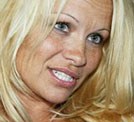 Except for the recently minted Independent Garth Turner, the 16 MP s who finally voted against the motion were all Liberals. While they came from only three provinces, they were still spread nicely enough from one end of the country to the other – outside Quebec of course:
Except for the recently minted Independent Garth Turner, the 16 MP s who finally voted against the motion were all Liberals. While they came from only three provinces, they were still spread nicely enough from one end of the country to the other – outside Quebec of course:
Vancouver and region in BC – Bell (North Vancouver), Chan (Richmond), Fry (Vancouver Centre);
Northern Ontario – Comuzzi (Thunder Bay-Superior North), Marleau (Sudbury);
Southwestern Ontario – Steckle (Huron-Bruce), Telegdi (Kitchener-Waterloo);
Greater Toronto Area – Bains (Mississauga-Brampton South), Dryden (York Centre), Karygiannis (Scarborough-Agincourt), McTeague (Pickering-Scarborough East), Minna (Beaches-East York), Volpe (Eglinton-Lawrence), and [the Independent] Turner (Halton);
Newfoundland & Labrador – Matthews (Random-Burrin-St. George’s), Simms (Bonavista-Gander-Grand Falls-Windsor).
NOTE AS WELL: The original reports of the vote on TV and in the press indicated that 266 MPs have voted Yes. But the official records of House business on the Internet report only 265.
Other events elsewhere on same day …
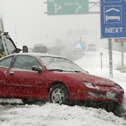 The unusual snow in Vancouver this (or any?) time of year, along with its current water problems, seemed to set the stage for the unusual events in Ottawa. Pathetic fallacy as they used to say in the old Ontario high school English classes, or something like that.
The unusual snow in Vancouver this (or any?) time of year, along with its current water problems, seemed to set the stage for the unusual events in Ottawa. Pathetic fallacy as they used to say in the old Ontario high school English classes, or something like that.
On a lighter note from the parliamentary debate: BELINDA STRONACH HAS DIED HER HAIR … dark brown. (Or just let it go back to its natural colour, one of our female counterweights editors suggests.) And on a related front, after her recent sojourn back home, supporting the Grey Cup champion BC Lions (for whom she used to be a cheerleader), the lustrous Pamela Anderson [see photo above] has filed for divorce again.
 The two federal by-elections held by chance on the same night as the Québécois nation vote in Ottawa resulted in no change of party standings in the Canadian House of Commons. Despite a strong second-place finish by new Green Party leader Elizabeth May, Glen Pearson held onto the Southwestern Ontario riding of London North Centre for the Liberals. And in the Montreal-area riding of Repentigny, “Raymond Gravel, who went from gay hooker to Roman Catholic priest, carried the Bloc [Qubcois] to an unsurprising win, grabbing nearly 70 per cent of the vote.”
The two federal by-elections held by chance on the same night as the Québécois nation vote in Ottawa resulted in no change of party standings in the Canadian House of Commons. Despite a strong second-place finish by new Green Party leader Elizabeth May, Glen Pearson held onto the Southwestern Ontario riding of London North Centre for the Liberals. And in the Montreal-area riding of Repentigny, “Raymond Gravel, who went from gay hooker to Roman Catholic priest, carried the Bloc [Qubcois] to an unsurprising win, grabbing nearly 70 per cent of the vote.”
As fate would have it, the Alberta provincial Progressive Conservative leadership contest is turning into more of a horse race than expected. And it will now be decided on Saturday, December 2, just like the federal Liberal race.
 The three leading contenders are: Jim Dinning, a more civilized and somewhat more centrist/pragmatic version of retiring leader (and Alberta premier) Ralph Klein; Ted Morton, a more civilized and more ideologically right-wing version of Ralph Klein (who has done better on the first round of voting than many thought he would); and Ed Stelmach, a farmer who is somewhere in between, and may win in the end.
The three leading contenders are: Jim Dinning, a more civilized and somewhat more centrist/pragmatic version of retiring leader (and Alberta premier) Ralph Klein; Ted Morton, a more civilized and more ideologically right-wing version of Ralph Klein (who has done better on the first round of voting than many thought he would); and Ed Stelmach, a farmer who is somewhere in between, and may win in the end.
Meanwhile, there is still much more Canadian political fun and games right ahead at the Liberal convention, which starts in Montreal on Tuesday, November 28. The first big event is Governor Howard Dean’s keynote address on Wednesday, November 29. The actual leadership contest, to be decided on Saturday, December 2, now seems more inscrutable than ever. But Belinda Stronach will be somewhere in the hall, with her mysterious new dark hair.
Earlier September 25 report: NEW QUEBECOIS NATION, HO HUM .. only a few are really interested .. yet?
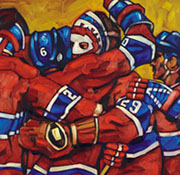 On Monday, November 27, 2006, it now seems, all four Canadian federal political parties in Parliament will join together and “recognize that the Québécois form a nation within a united Canada” – whatever that may or may not mean in the real world of Canadian politics today. It could mark a turning point. Or it could mean not much at all. It could even be a farce. Only time will tell … etc.
On Monday, November 27, 2006, it now seems, all four Canadian federal political parties in Parliament will join together and “recognize that the Québécois form a nation within a united Canada” – whatever that may or may not mean in the real world of Canadian politics today. It could mark a turning point. Or it could mean not much at all. It could even be a farce. Only time will tell … etc.
Meanwhile, what is clear to us here is that hardly anyone has been interested in reading the short report on the issue we posted late Wednesday night (below). In all this e-magazine’s history to date (2 .2 years), no other article has received a smaller immediate response in the user statistics. And the big public question we’re wondering about most right now is why? Or even why not?
Yeah, whatever … 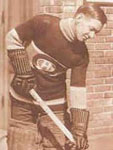
Two quite different Toronto Globe and Mail columnists may have shed some helpful light on the initially subdued wider reaction to the surprising unanimity of all federal parties on the Québécois “birth of a nation” (as a tongue-in-its-cheek headline in the rival Toronto Star put it).
The first is Rick Salutin on Friday, November 24: The “motion presented by Prime Minister Stephen Harper on Québécois’ being a nation’ is benign … for now, it lets all the party players off the hook and punts the discussion back to the popular level, where it does best. It’s the equivalent of saying: Yeah, whatever.”
The second is John Ibbitson on Thursday, November 23: “Veterans of Charlottetown, Meech and the referendums throw wine glasses at each other over whether and how the Constitution should recognize and protect Quebec’s distinctiveness. For anyone under 40, it’s so obvious that Quebec is its own nation that the subject isn’t worth discussing … They know that what matters far more is the progress of the Quebec nation and the evolving post-national Canada to which it belongs.”
Does the Bloc’s ultimate decision to support Harper’s motion too make the whole thing a farce?
 As explained in the Vancouver Sun, the latest most stupendous news is that not only will the Liberals and the New Democrats be supporting Stephen Harper’s resolution, so in the end will Gilles Duceppe’s sovereigntist Bloc Québécois – even though Duceppe was very critical of Harper’s exact words on Wednesday.
As explained in the Vancouver Sun, the latest most stupendous news is that not only will the Liberals and the New Democrats be supporting Stephen Harper’s resolution, so in the end will Gilles Duceppe’s sovereigntist Bloc Québécois – even though Duceppe was very critical of Harper’s exact words on Wednesday.
Ottawa journalist Susan Delacourt on TV Ontario Friday night said this was threatening to turn the whole thing into a farce (even granting that Stephen Harper did look good introducing his resolution in the House). The other side of the coin has to be that the Canadian House of Commons will apparently be pretty close to unanimous in endorsing the concept of the Qubcois as a nation within a united Canada. And things weren’t that decisive, e.g, when Jean Chretien’s majority Liberals declared Quebec a distinct society after the 1995 referendum. Some kind of progress along some kind of path is being made. (Even if a lot of it is for quite low political reasons. Especially in Canada, it sometimes seems, that’s how democracy works.)
Reaction in Quebec
 As also reported in the Vancouver Sun, by Les Perreaux of The Canadian Press: “Many Quebecers met Prime Minister Stephen Harper’s sudden embrace of their nation with a cynical shrug Thursday while some scholars praised it as a small gesture toward fulfilling Quebec’s longing for outside affirmation.”
As also reported in the Vancouver Sun, by Les Perreaux of The Canadian Press: “Many Quebecers met Prime Minister Stephen Harper’s sudden embrace of their nation with a cynical shrug Thursday while some scholars praised it as a small gesture toward fulfilling Quebec’s longing for outside affirmation.”
East of the Ottawa River itself, Le Devoir has reported “Le Québec reconnu comme nation – Une motion sans consquence, avoue Ottawa.” (And for the same theme in English see “Tories play down constitutional fallout” in the Toronto Globe and Mail, and “No legal impact, Tories admit” in the Vancouver Sun.)
And see two more Le Devoir articles for further news from Quebec: “Le Québec, une nation dans un Canada uni – La résolution Harper fait progresser le Québec, selon Boisclair” ; and “Débat sur la nation québécoise – Dumont y voitune porte ouverte.”
More about how it all happened … and what if anything may come?
 Both the Globe and Mail and the Toronto Star have background stories on just how Stephen Harper’s resolution was so quickly fabricated on Tuesday, November 21 and Wednesday, November 22. The key people consulted outside the Conservative Party were apparently interim Liberal leader Bill Graham (more than once), NDP leader Jack Layton (only once?), and the one Liberal leadership candidate from Quebec, Stephane Dion. (“It’s very close to the compromise that I have suggest to my party two weeks ago. To the other candidates some weeks ago,’ Mr. Dion told reporters Thursday … Quebec is a nation in the sociological sense within Canada, so the solution is that Quebeckers are a nation within a united Canada… not Quebec as a legal entity.'”)
Both the Globe and Mail and the Toronto Star have background stories on just how Stephen Harper’s resolution was so quickly fabricated on Tuesday, November 21 and Wednesday, November 22. The key people consulted outside the Conservative Party were apparently interim Liberal leader Bill Graham (more than once), NDP leader Jack Layton (only once?), and the one Liberal leadership candidate from Quebec, Stephane Dion. (“It’s very close to the compromise that I have suggest to my party two weeks ago. To the other candidates some weeks ago,’ Mr. Dion told reporters Thursday … Quebec is a nation in the sociological sense within Canada, so the solution is that Quebeckers are a nation within a united Canada… not Quebec as a legal entity.'”)
Where does it all go from here? Part of the subdued reaction, no doubt, is that many especially outside Quebec are still uncomfortable about what may or may not have been done. At most, it would seem, Canadians in all parts of the country and the Québécois will be test-driving this version of what Stephane Dion calls “the solution” over the next while, to see if it does make better sense than whatever it is we have now – or any sense at all? Meanwhile, the next big step will be the actual vote, apparently on Monday, November 27. And we’ll have one last short report on that as well, just in case it does prove important at some point further down the road.
Initial November 22 report and commentary: QUELLE SURPRISE .. Now three parties agree Québécois a nation within united Canada!
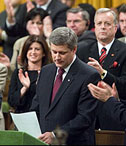 OTTAWA, NOVEMBER 22, 2006. Just when it seemed that Stephen Harper’s Conservative minority government had been altogether waylaid by income trusts, the US mid-term elections, the environment, the China syndrome, and on and on, the prime minister himself has stolen a shaky leaf from an increasingly anxious Liberal leadership race and turned it to his own advantage. (And also done something essentially non-partisan, for the good of all of Canada?)
OTTAWA, NOVEMBER 22, 2006. Just when it seemed that Stephen Harper’s Conservative minority government had been altogether waylaid by income trusts, the US mid-term elections, the environment, the China syndrome, and on and on, the prime minister himself has stolen a shaky leaf from an increasingly anxious Liberal leadership race and turned it to his own advantage. (And also done something essentially non-partisan, for the good of all of Canada?)
At about 3:15 ET this afternoon Prime Minister Harper submitted to Parliament the resolution “this House recognize that the Québécois form a nation within a united Canada.” It appears that both the Liberals and the New Democrats will be supporting the resolution, the exact language having been cleared beforehand. The plot was apparently fully hatched overnight. And it may just have turned a corner on some kind of important Canadian nation-building trick, at last.
A quick thumbnail sketch … 
The Montreal-based editor of Policy Options magazine, L. Ian MacDonald, outlined just how almost astonishingly quickly this quite unexpected train of events was stuck together in Ottawa, on CBC TV early this evening. But if it does prove to be the kind of historic development that some are already suggesting, the future will probably note that Canadian politicians and even the Canadian people at large have been working on it all ever since the second Quebec sovereignty referendum in 1995.
The more recent history of what seems to have happened in the federal Parliament today, however, only goes back to Michael Ignatieff’s recent Liberal leadership campaign proposal that Quebec be recognized as a nation within Canada, or words to that effect. This has subsequently come to too-much dominate the Liberal leadership race – to the point where interim Liberal leader Bill Graham had “summoned all eight party leadership contenders to an emergency meeting Thursday [i.e. tomorrow] morning to find a way out of the crisis over whether the party should recognize Quebec as a nation.”
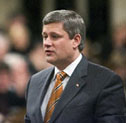 The same issue had also begun to create problems for Mr. Harper inside his own Conservative Party. His strategically important members from Quebec supported some kind of national recognition for Quebec. And the surprising support he won in Quebec in this past January’s federal election has been deflating precipitously, as a result of his government’s positions on such issues as Afghanistan and the Kyoto Accord. At the same time, he has Western and especially Alberta members of his party whose approach to Quebec is at least in some ways no less federally aggressive than Pierre Trudeau’s.
The same issue had also begun to create problems for Mr. Harper inside his own Conservative Party. His strategically important members from Quebec supported some kind of national recognition for Quebec. And the surprising support he won in Quebec in this past January’s federal election has been deflating precipitously, as a result of his government’s positions on such issues as Afghanistan and the Kyoto Accord. At the same time, he has Western and especially Alberta members of his party whose approach to Quebec is at least in some ways no less federally aggressive than Pierre Trudeau’s.
Hoping to profit from divisions on the issue among both Conservatives and Liberals, Bloc Québécois leader Gilles Duceppe let it be known yesterday that his party “will bring forward a motion Friday [the day after tomorrow] calling on the House of Commons to recognize that Quebeckers form a nation … The vote on that likely will be next week, in time for the start of the Liberal convention.” This apparently gave Prime Minister Harper the idea of forestalling the Bloc motion with a motion of his own that would say something similar but in a different way. Again, if L. Ian MacDonald is to be believed, Mr. Harper quickly consulted with Mr. Graham (and Jack Layton?) on the language of his resolution. The rest, as they say, is already history.
Some initial reactions …
 All this has happened so quickly that a prudent person is bound to say let’s wait for a bit and see exactly what it may or may not really mean, before jumping to any too profound conclusions.
All this has happened so quickly that a prudent person is bound to say let’s wait for a bit and see exactly what it may or may not really mean, before jumping to any too profound conclusions.
For one thing, it seems one key to Mr. Harper’s resolution is that it recognizes “Québécois” (or “Quebeckers”) – and not, e.g., “Quebec” – “form a nation within a united Canada.” According to L. Ian MacDonald this recognizes the sociological reality of the French Canadian nation in Quebec, without acknowledging any particular political implications of this reality (beyond the also stated point that it is “within a united Canada.”)
Or, as Mr. Harper put it in Parliament this afternoon: “Our position is clear. Do the Québécois form a nation within Canada? The answer is yes. Do the Québécois form an independent nation? The answer is no and the answer will always be no.” Mr. Harper also said that he himself continued to believe that the issue of Quebec’s nationhood should finally be decided by the National Assembly in Quebec. But: “The Bloc Québécois has asked us to define this, and perhaps that’s a good thing because it reminds us that all Canadians have a say in the future of this country.”
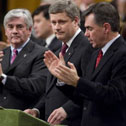 According to CBC News, at least one Liberal MP in Ottawa is not too happy about supporting even Mr. Harper’s careful version of the proposition. But interim leader Bill Graham has said “that his MPs will meet … to discuss the motion and he expressed confidence they will unite behind it.” At the same time, “NDP Leader Jack Layton said his party would support both the government and the Bloc motions.”
According to CBC News, at least one Liberal MP in Ottawa is not too happy about supporting even Mr. Harper’s careful version of the proposition. But interim leader Bill Graham has said “that his MPs will meet … to discuss the motion and he expressed confidence they will unite behind it.” At the same time, “NDP Leader Jack Layton said his party would support both the government and the Bloc motions.”
The “Bloc motion calls for Quebec to be recognized as a nation but does not include the words in Canada.'” (I.e. the NDP is also willing to declare in effect that the Quebec nation has a right to secede from Canada, as it were – which neither the Conservatives nor the Liberals are willing to do. Or, again, as Mr. Harper put it: “Do the Québécois form an independent nation? The answer is no and the answer will always be no.”)
While L. Ian MacDonald seemed rather sanguine about the benevolent Canadian national effects of Prime Minister Harper’s resolution in various directions (including inside Quebec), other initial commentators on CBC TV later this evening presented a much more mixed bag of reactions. We the Canadian people no doubt will have to wait and see just how the dust finally starts to settle, among various diverse groups and places in what Stephen Harper has called “this eclectic country,” before making up our own minds about anything.
 For the moment we the counterweights editors nonetheless remain more impressed than usual with our Canadian federal politicians – and more hopeful that some kind of light at the end of the long Canada and Quebec tunnel of the past 30 years and more is shining more brightly than usual too. And, whatever Stephen Harper’s weaknesses as prime minister may be on so many other fronts, today on this Canadian home front he did look very good.
For the moment we the counterweights editors nonetheless remain more impressed than usual with our Canadian federal politicians – and more hopeful that some kind of light at the end of the long Canada and Quebec tunnel of the past 30 years and more is shining more brightly than usual too. And, whatever Stephen Harper’s weaknesses as prime minister may be on so many other fronts, today on this Canadian home front he did look very good.
Who knows? Maybe the West finally will be able to help resolve at least some of the longstanding Canadian nation-building problems that have for so long eluded the East. (The CBC TV commentator we liked best later this evening was also Gordon Gibson from BC.)
Mr. Harper has already started one ball rolling towards step-by-step Senate reform. Now he just may have taken a useful enough step towards some kind of stable, long-term solution that will work for both Quebec and the rest of Canada too. We’re ready to be optimistic at least, until it’s altogether clear that it’s just yet another mirage in the Arctic desert. And we certainly hope it’s a little more than that.
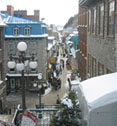 From the start some 400 years ago or more, which was alluded to several times in Parliament this afternoon (another sign of progress in itself), modern Canada has been a recurrently lucky country, in the midst of recurrent difficult circumstances. There are a lot of hard problems and the destiny is arduous, etc. And then suddenly, and often for some quite low political reasons, things come together in a lucky way again, and the place just goes on and on, longer than anyone elsewhere ever thought possible. As Prime Minister Harper himself told us this afternoon, when Champlain founded Quebec City in 1608 he didn’t say oh this is just impossible, it’s too cold, and so forth. He just rolled up his long silk sleeves and got on with the job.
From the start some 400 years ago or more, which was alluded to several times in Parliament this afternoon (another sign of progress in itself), modern Canada has been a recurrently lucky country, in the midst of recurrent difficult circumstances. There are a lot of hard problems and the destiny is arduous, etc. And then suddenly, and often for some quite low political reasons, things come together in a lucky way again, and the place just goes on and on, longer than anyone elsewhere ever thought possible. As Prime Minister Harper himself told us this afternoon, when Champlain founded Quebec City in 1608 he didn’t say oh this is just impossible, it’s too cold, and so forth. He just rolled up his long silk sleeves and got on with the job.

